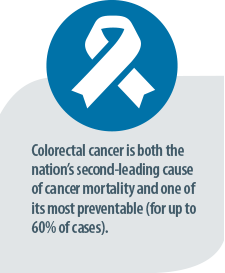
![]()
 Health care is an endless pursuit of excellence — in improving care quality, enhancing the patient experience, and extending lives.
Health care is an endless pursuit of excellence — in improving care quality, enhancing the patient experience, and extending lives.
To that end, the Highmark Cancer Collaborative made great strides  in its inaugural year toward revolutionizing care delivery for cancer patients. In 2017, one such accomplishment was the development of a new colorectal cancer care model, an approach to care that Highmark is supporting on a wider basis.
in its inaugural year toward revolutionizing care delivery for cancer patients. In 2017, one such accomplishment was the development of a new colorectal cancer care model, an approach to care that Highmark is supporting on a wider basis.
Implemented initially at Collaborative partner Allegheny Health Network (AHN), the new model promises to improve teamwork among physicians and help ensure the most appropriate and safest treatment for colorectal cancer patients. The model also aims to create a better overall patient experience (from diagnosis through final treatment and beyond), improve outcomes, and lower costs.
The strength of the model lies in providers adopting evidence-based, colorectal cancer clinical pathways recommended by leading national cancer experts and specialty societies. In addition to those care improvements, the model is based around innovative changes on the insurance-coverage side; these enhancements include reimbursing providers in a way that supports provider adherence to the new care pathways.*
And those pathways are powered by advanced information technology systems that participating physicians use to guide patient care.
Published studies have shown that adherence to such pathways translates into higher care quality; safer, more effective treatment; fewer hospital admissions; and more cost-effective care for cancer patients.**
 Why target colorectal cancers?
Why target colorectal cancers?Cancer has exacted a heavy toll on patients and their families, both in terms of lives affected and personal financial cost.
Colorectal cancer is both the nation’s second-leading cause of cancer mortality and one of its most preventable (for up to 60% of cases).
Additionally, the average cost of care per episode to treat a colon cancer patient was around $77,000 in 2015. For rectal cancer patients, the cost per case was $64,500. And, within those overall costs, chemotherapy was a major expense — $40,000 for colon cancer and $29,000 for rectal cancer.+
The Collaborative looked at colorectal cancer treatment from start to finish. Cancer physicians, clinicians, and researchers sought ways to improve everything from how patients and physicians communicate, to how oncologists diagnose colorectal cancers and order treatments, to how patients navigate through their course of care.
As a result of initial implementations, the model’s new clinical pathways were adopted, provider reimbursement was redefined, and patient care was redesigned to be more engaging and efficient. And the model called for the establishment of the Multi-Disciplinary Cancer Conference (MDCC) review board to examine colorectal cancers and provide a comprehensive evaluation of each patient case to develop the best course of treatment.
Today, comparing patient data against the clinical pathways, participating physicians are able to:
To date, participating Collaborative physicians made 259 patient decisions with 80% adherence to the new colorectal cancer pathways.
Additional benefits of the new colorectal cancer care model’s workflow include:
The number of participating Collaborative physicians and hospitals continues to grow throughout Pennsylvania. But Highmark saw how application of the new colorectal cancer model would benefit all Highmark members, not just those treated through Collaborative partner doctors and hospitals.
“As a Cancer Collaborative partner, Highmark helped to develop the new colorectal cancer care model alongside the medical, clinical, and research experts at Allegheny Health Network for replication with other provider partners," says Nancy Myers, vice president of Clinical Transformation for Highmark.
“It exemplifies what we’re all working to achieve on an even larger scale — transform care, create a better experience for all patients, and give them a greater value.”
In time, data and details will be shared on how the new care model is working to improve screening, diagnosis, and treatment for colorectal cancer patients. Watch Provider News for updates, including news about other Highmark Cancer Collaborative success stories.
*Providers participating in the Cancer Collaborative retain their independent judgment regarding the treatment of their patients.
**Savings on aggregated breast, colon, and lung cancer spending as high as 15% can be achieved in the first year of a pathways program with as much as a 7% reduction in hospital admissions (Third-Party Validation of Observed Savings from an Oncology Pathways Program. 2013 AJMC.com  Journals). Additionally, a national study published in the Journal of Oncology Practice, 2010, found that patients following evidence-based clinical pathways for oncology treatments saw 35% lower costs vs. off-pathway patients.
Journals). Additionally, a national study published in the Journal of Oncology Practice, 2010, found that patients following evidence-based clinical pathways for oncology treatments saw 35% lower costs vs. off-pathway patients.
+Highmark data